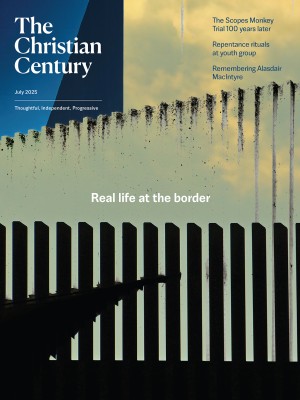July 6, Ordinary 14C (2 Kings 5:1-14)
God’s saving work is never too big for ordinary moments or casual conversations.
It could be on the front page of a tabloid: “Prestigious Army Commander Healed by Bizarre Ritual from Prophet.” Naaman’s story is a dramatic tale with surprising twists. But even though the storyline is compelling, it’s the peripheral characters that capture my attention for deeper reflection. The young Israelite girl who serves in Naaman’s house, his personal servants who accompany him to visit Elisha—these are the unassuming voices that propel him toward healing. They are not the heroes of the story, but their actions are noteworthy because without them Naaman would continue to suffer from his disease. It’s faith affirming to pause and remember the people in our own life stories whose influence altered our choices and turned us toward a new wholeness. God’s saving work is never too big for ordinary moments or casual conversations.
Naaman’s first turn toward healing isn’t the result of a direct request. Desperation and pain prompt people to take chances, and Naaman is suffering. So he leans into an unlikely source of help, following the one-off lead of his wife’s servant girl. This young Israelite surely has her own traumatic story of being removed from her home and forced to serve her captors. Is she a naturally compassionate person, genuinely concerned about his suffering from chronic pain? Or is she merely thinking out loud, wistfully remembering her home, where she knew love, comfort, and wholeness? Whatever the reasons, her innocent musings begin a cascade of conversations and action.
Read our latest issue or browse back issues.
It’s easy to dismiss the value of a younger person’s perspective because they seem too inexperienced, too naive, or too literal. But Jesus is clear when he commends the value of a childlike faith: “Whoever does not receive the kingdom of God as a little child will never enter it” (Luke 18:17). Children are not a peripheral oddity to Jesus but an essential doorway toward God’s intentions. When we seriously consider ideas from members of a younger generation, we can glean unexpected insights. Are we open to unlikely sources for new hope? What voices are we willing to listen to?
Naaman’s personal travel attendants help guide him toward healing too. They probably have also witnessed the depth of his suffering, maybe even suffered a bit themselves because of it. Chronic pain can make life miserable for the afflicted and those close to them alike. So Naaman’s healing and relief could mean an easier existence for them. They are accustomed to taking his orders and being subservient to him. So they listen to his complaint that Elisha’s instructions are too simplistic and meaningless, and they watch him angrily reject the possibility of healing. In a bold and perhaps risky response, they question him. They prod him to reconsider following Elisha’s instructions. They take the leap of faith and imagine healing for him. Whether it comes from his wisdom as a leader or his desperation as a person in pain, Naaman’s willingness to listen to others points him toward wholeness.
In our current political milieu, many feel powerless against the larger-than-life rulers who make and break the patterns of life. We need the reminder that ordinary, relatively powerless people are very often the links to life-giving change for our spiritual lives. As followers of Jesus we can imagine the healing and wholeness our hurting world needs. Will we be vulnerable enough to voice our dreams? Can we be bold enough to redirect others toward wholeness? With the compassion of real love for others, we could rouse ourselves from despair and regain our footing as people of hope. We could be dreamers of God’s great plan of wholeness, joining with God’s Spirit to expect it, move toward it, and create it.
Steven Charleston writes in Ladder to the Light about a vision he had:
I saw an older man standing alone by the side of the road. He kept looking down that road as if he was expecting a bus, but no bus stopped there. When I mentioned that to him, he said he was not waiting for a bus. He was waiting for a parade. He had heard that if you wait long enough, the parade would come back down your street. He had missed it before and he did not want to miss it again. I looked at him. He was different from me. Different color. Different religion. He looked a little grubby and he had an accent, but I decided it didn’t matter. He was a person. I was a person. He needed a parade. I needed a parade. He had hope. I had hope. So I waited beside him, looking down the street in the same direction. And the minute I did, we both heard music in the distance.





